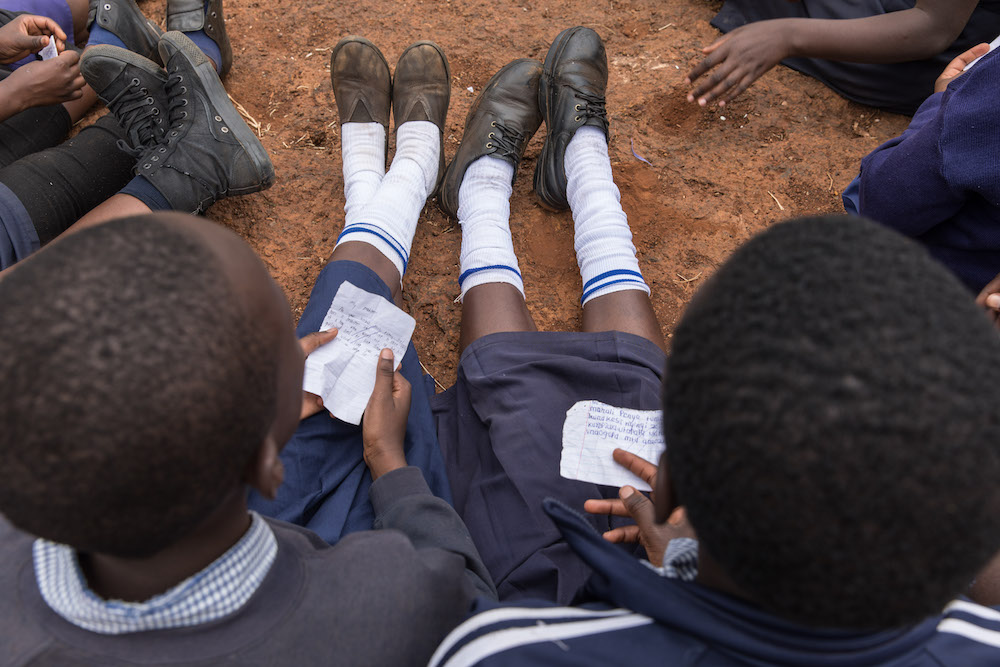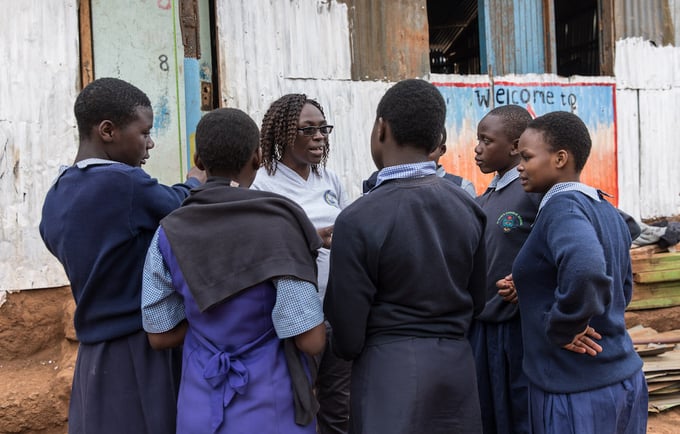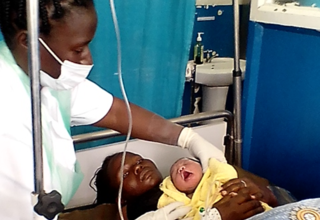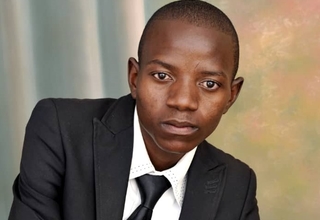NAIROBI, Kenya—“I slept in the toilet for three days because my mother chased me out of the house,” says Julie Atieno*, 13. As she describes her ordeal under the COVID-19 lockdown to a mentor, she can barely hold back her tears.
Adolescent girls and young women growing up in Kibera, a large informal settlement in Nairobi, face many challenges. Teenage pregnancy has been a key concern in Kenya, with an estimated one in five teenaged girls between the ages of 15 and 19 being pregnant or having already given birth (KDHS). Girls in Kibera are more vulnerable than most.
I slept in the toilet for three days because my mother chased me out of the house.
These girls depend on school-based programmes to meet their basic needs, such as food, sanitation and sanitary towels. When schools closed in March this year due to the pandemic, they lost access to this support, placing them in an increasingly precarious position.
In April, the government put in place a partial lockdown, which affected household livelihoods and led to an increase in gender-based violence (GBV), sexual harassment of adolescent girls, and extortion of sex. Movement in and out of counties was curtailed and this, together with a dusk-to-dawn curfew, dealt a significant blow to the livelihoods of Kibera residents, who tend to live hand to mouth. Many lost their jobs and most small-scale businesses experienced low profit margins.
Sex in exchange for basic needs being met

For adolescent girls, the lockdown has been especially difficult. Not only did they lose access to their basic requirements being met at school, but their parents have had no source of income. Many girls have resorted to having sex in exchange for money to manage their menstruation and other basic needs – a ‘solution’ that brings even more difficult challenges, such as unplanned pregnancy and GBV.
Under the lockdown, girls have streamed into the Polycom Development Offices to discuss the issues they face, ranging from pregnancy to sexual harassment, relationships souring with their caregivers, a lack of food and lack of access to sanitary towels. The Polycom Development Project, forged in partnership with UNFPA in Kenya, offers these girls mentorships and the ability to learn life skills.
Each year, the programme serves more than 6,000 girls aged 9 to 19, equipping them to fight for their rights and to handle the challenges they face. It helps them discover their leadership capabilities and build confidence. They are also enabled to make informed choices when it comes to their sexual and reproductive health.
Many of these girls have found a safe space within the mentorship program and they are actively engaging in pivotal conversations. UNFPA and Polycom envision that the platforms they provide will contribute towards their growth – mentally, physically and socially.
Anonymous notes through Talking Boxes
One of the platforms is Talking Boxes, which allows girls to post anonymous notes describing their challenges and experiences. The locked boxes are installed at schools, at a safe space proposed by the girls, to ensure their anonymity. The notes are collected regularly by trained mentors who read them and respond through forums or during one-on-one mentorship sessions.
During the COVID-19 pandemic, UNFPA has supported Polycom Development Project to establish handwashing stations, provide free detergents and sanitary towels, and conduct mentorship forums for adolescent girls. To date, more than 10,000 girls have been reached through direct interaction and via radio programmes hosted by Pamoja Radio.
In addition, because of a rise in teenage pregnancies during the lockdown and as a result of school closures, Polycom has initiated a programme for adolescent mothers to meet, share their experiences and get advice on how to organize their lives going forward. They are also assisted with reconciling with their parents, if they have been estranged, and with returning to school after delivering their babies.
While the curfew and lockdown have now eased, and business is slowly returning to normal, it will likely take some time before Kibera’s residents have recouped their losses. Polycom and UNFPA will continue to provide ongoing support to the settlement’s adolescent girls to ensure that they, like Julie, have a brighter future.
* Name changed to protect her privacy.




